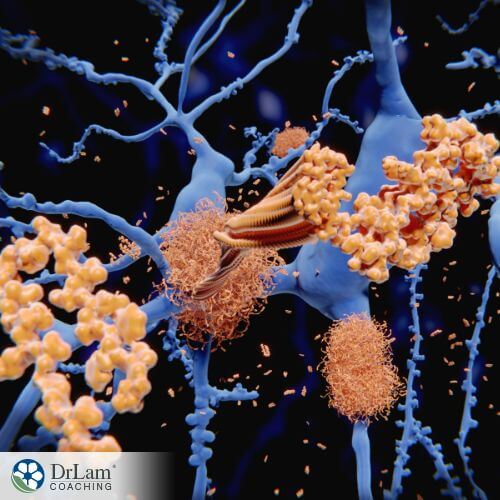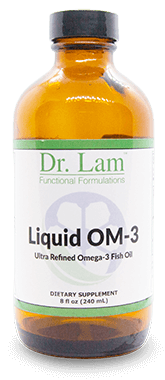 Alzheimer's disease is a condition that more than six million individuals experience. Besides reducing brain health, it also has a devastating effect on quality of life. On a cellular level, studies suggest that two different protein formations, amyloid plaques and tau tangles, may be the culprit behind the occurrence of Alzheimer's. This article will explore these formations, what they are, why they happen, and if there is anything that can be done to reduce and prevent them.
Alzheimer's disease is a condition that more than six million individuals experience. Besides reducing brain health, it also has a devastating effect on quality of life. On a cellular level, studies suggest that two different protein formations, amyloid plaques and tau tangles, may be the culprit behind the occurrence of Alzheimer's. This article will explore these formations, what they are, why they happen, and if there is anything that can be done to reduce and prevent them.
Brain health is considered the state of the brain's functioning across different domains (1). These domains are:
Within the brain, there are specific structures that help it to carry out its roles. The brain cells are also called neurons. Within the neuron is the cell body that contains the genetic material to carry out its role. Dendrites are structures that branch off these cell bodies to collect information from other neurons. The axon is the nerve fiber that assists with communication; it is either connected to another neuron or a muscle or gland cell.
There are different processes that are necessary for optimal functioning as well as survival of the neurons. If these processes cannot be carried out, the neuron will eventually die. These processes are:
As you age, your brain will shrink, but you do not lose a significant amount of neurons as you age. In Alzheimer's, however, there is a significant loss of neurons that results in a decline in brain function. This is due to the malformation of two different proteins:
The early stages of Alzheimer's involve a loss in memory. The damage then spreads to the parts of the brain responsible for language, reasoning, and social behavior (2).
Beta-amyloid is a protein fragment. Generally, these fragments are small and can dissolve in the fluid between the brain cells. This is then removed by the brain. However, sometimes, these amyloid deposits are larger and sticky and clump together, forming a plaque. These beta-amyloid plaques occur between the brain cells and are found in individuals with conditions such as Alzheimer's. Amyloid plaques start to occur in the hippocampus part of the brain; here, they can start to affect communication and then memory. The amyloid plaque triggers an immune response resulting in cell death.
This tangle occurs in a protein called tau, a microtubule that helps to transport nutrients to different parts of the brain cells. This tangle is an abnormal folding of helical filaments. When the tangle occurs, nutrients cannot be transported throughout the cell. The tangle attracts additional tau proteins to make it longer to assist with the transport. This could be why the tau tangles have different shapes for different brain conditions. The tau tangles create specific, abnormal shapes. In Alzheimer's, it forms a C shape, whereas in Picks disease, it forms a J shape. Tau tangles interfere with the cells functioning, killing the cell. The more tangled the protein is, the greater the effect on brain health.
The exact causes of these formations are unknown. However, potential factors that can cause it include:
 Age
AgeUnfortunately, there is no know cure for Alzheimer's. However, it may be possible to slow the progression of the condition. In addition, it is possible that these protein malformations could be reduced and reversed through various lifestyle changes.
The Mediterranean-Dash diet intervention for neurodegenerative delay (MIND) diet and the Mediterranean diet are two nutritional approaches that may assist in enhancing brain health. These diets are both plant-based and focus on:
The differences between these two diets are in the finer details. The MIND diet combines two popular diets, the Mediterranean diet as well as the Dietary Approaches To Stop Hypertension (DASH) diet. This diet was designed to protect and enhance the health of the brain and to enhance cognitive health. It focuses on vegetables such as spinach and kale and favors berries for fruits. Beans and nuts are encouraged and fish is recommended once a week or more if possible.
Foods that are recommended in moderation on the MIND diet are:
As this diet is a hybrid of two popular diets, it may have antioxidant effects as well as anti-inflammatory effects. These can both help to reduce inflammation, promoting brain health and reducing cognitive decline.
The Mediterranean diet refers to the diet that countries in the Mediterranean consume. It doesn't favor specific fruits and vegetables over one in particular and focuses on fish at least three times a week. This diet can help reduce inflammation, enhancing brain health.
One study found that in obese women, the MIND diet helped to improve memory and attention. A recent study has shown promising results in people with Alzheimer's. In this study, participants on both of these diets showed fewer signs of Alzheimer's due to lower levels of amyloid plaques. However, there was no change in tau tangles. Whilst specific foods were not studied, it does suggest that diet is important in helping to manage Alzheimer's (3).
The MIND and Mediterranean diet both show promise in brain health and this could be due to the combination of nutrients within these diets.
Omega-3 fatty acids are one nutrient that may assist in reducing amyloid plaques and neurofibrillary tangles. Omega-3 fatty acids are found in oily fish such as salmon, and sardines as well as plant-based sources such as chia, flax seeds, and walnuts. However, they are more bioavailable from fish. These fatty acids may help to reduce inflammation within the brain and the production of amyloid plaques. One study found that omega 3 could help to promote the clearance of beta-amyloid protein through the blood-brain barrier (4). Dr. Lam's Liquid OM-3 is an outstanding supplement, recognized for its high concentration of omega-3 fatty acids, notably EPA and DHA. Liquids provide the purest form of omega-3's that one can intake. Harvested from "pharmaceutical-grade" fish oil, a single lemon-flavored teaspoon of Liquid OM-3 offers a robust 1,500 mg each of EPA and DHA, allowing individuals to conveniently and pleasantly incorporate these beneficial compounds into their daily routine.
 Vitamin D may also play an important role in managing these formations. Not only can you receive it from food, but you can also receive it from the sunlight. This vitamin helps to regulate inflammation in the body, thus helping to balance the immune system and promoting the production of growth factors that are neuroprotective. Amyloid plaques and tau tangles increase inflammation within the brain, which contributes to the decline in cognition. One study suggests that supplementation in mice with vitamin D for five months reduced the number of amyloid plaques in the brain. Whilst this study is promising, more research is necessary on this link (5). Be sure to take in Vitamin K2 to help the absorption of Vitamin D3 if you are planning to supplement.
Vitamin D may also play an important role in managing these formations. Not only can you receive it from food, but you can also receive it from the sunlight. This vitamin helps to regulate inflammation in the body, thus helping to balance the immune system and promoting the production of growth factors that are neuroprotective. Amyloid plaques and tau tangles increase inflammation within the brain, which contributes to the decline in cognition. One study suggests that supplementation in mice with vitamin D for five months reduced the number of amyloid plaques in the brain. Whilst this study is promising, more research is necessary on this link (5). Be sure to take in Vitamin K2 to help the absorption of Vitamin D3 if you are planning to supplement.
These are plant-based compounds, and some may help to protect your brain from amyloid plaques and tau tangles. Some of these polyphenols, such as those found in red wine and berries, may help to protect the neurons from the toxic effect of plaque and may help to reduce behavioral impairment.
Curcumin is another polyphenol that may assist. This polyphenol is available in turmeric. It may help to protect your brain through several mechanisms. These include reducing oxidative stress, thus improving inflammation; reducing the production of beta-amyloid, thus reducing the occurrence of amyloid plaques; and improving cognitive deficits. Curcumin is lipophilic in nature, meaning it dissolves in fat. This gives it the ability to cross the blood-brain barrier. Once it crosses the barrier, it can reduce plaques by binding with the beta-amyloid proteins, destabilizing them, and preventing them from growing (6).
Exercise is part of a healthy lifestyle and may help to improve your brain health, directly as well as indirectly. Indirectly, it helps to reduce the occurrence of chronic conditions that may increase the risk of Alzheimer's.
Exercise helps to not only pump blood through your body, but it also helps to oxygenate your blood. These two factors help to keep your brain healthy and can help stimulate the growth of new nerve cells in the hippocampus, the area that is responsible for memory.
Mild to moderate exercise can help to reduce inflammation within the brain by reducing the occurrence of plaques and neurofibrillary tangles. Moderate and high intensities of exercise may help to further protect the brain by producing antioxidants enzymes and growth factors. These growth factors may help to encourage the growth of new brain cells. Exercise may also help to reduce the production of free radicals, which can cause a further decline in brain health (7).
There are many different factors that can affect brain health, and one that is not always given enough weight is chronic stress. Your body has the ability to handle stress through the NeuroEndoMetabolic (NEM) Stress Response System. This system consists of six different circuits of related organ systems that help to support your body. In short-term stress, your adrenal glands will release stress hormones such as cortisol. When stress continues, your adrenal glands can become depleted, and this can cause imbalances within the NEM system.
When this happens, symptoms start to occur and Adrenal Fatigue Syndrome (AFS) starts. AFS is the non-Addison's form of adrenal dysfunction, where the body's stress response cannot keep up with life's chronic stressors. Symptoms of AFS will depend on which circuit the imbalance is occurring in.
One of the circuits in the NEM system is the Neuroaffect circuit. This consists of your brain, autonomic nervous system, and gut microbiome. The role of this circuit is to help regulate your emotional and mental health. Symptoms that can occur with an imbalance within this system include feelings of brain fog, anxiousness, depression, and difficulty falling and staying asleep.
Stress can also cause changes in the physical structure of the brain. Some symptoms from changes in the brain include learning difficulties, depression, and a reduction in connection between the neurons. Stress also creates inflammatory substances that can cause brain cells to die. This may increase the chances of brain conditions such as Alzheimer's occurring.
 The MIND and Mediterranean diet may help individuals with AFS in reducing brain inflammation and may help with the production of new brain cells. However, support is necessary for these individuals to help correct the imbalance within the Neuroaffect circuit. It is important to see a doctor familiar with AFS to develop a plan to support full-body health and AFS recovery in this case. In addition, the body can become sensitive during AFS. In this case, gentle exercise such as restorative yoga may be more effective. Caution is also required in adding new supplements or foods to the diet.
The MIND and Mediterranean diet may help individuals with AFS in reducing brain inflammation and may help with the production of new brain cells. However, support is necessary for these individuals to help correct the imbalance within the Neuroaffect circuit. It is important to see a doctor familiar with AFS to develop a plan to support full-body health and AFS recovery in this case. In addition, the body can become sensitive during AFS. In this case, gentle exercise such as restorative yoga may be more effective. Caution is also required in adding new supplements or foods to the diet.
Alzheimer's disease is a debilitating condition, and whilst there is no cure, there are strategies that may be effective at reducing the amyloid plaques and tau tangles that are implicated in this condition. These strategies involve nutritional strategies such as the MIND and Mediterranean diet as well as exercise.
There are many different potential causes for reduction in brain health and one of them is chronic stress. Whilst stress can be a common experience for many, chronic stress can have serious repercussions on your brain health. If you are currently experiencing changes in sleep patterns and developing feelings of depression and anxiety, it may be the result of chronic stress. If you would like assistance with helping to support your body to heal from this effect, you can call the Dr. Lam team.We offer a free, no-obligation phone consultation at +1 (626) 571-1234 where we will privately discuss your symptoms and various options. You can also send us a question through our Ask The Doctor system by clicking here.

High Quality Fish Oil to Improve Brain Health
World Health Organization. "Brain Health." https://www.who.int/health-topics/brain-health#tab=tab_1
National Institute of Aging. "What Happens to the Brain in Alzheimer's Disease." Updated May 2017. https://www.nia.nih.gov/health/what-happens-brain-alzheimers-disease
National Institute of Aging. " MIND and Mediterranean Diets Linked to Fewer Signs of Alzheimer's Brain Pathology." May 2023. https://www.nia.nih.gov/news/mind-and-mediterranean-diets-linked-fewer-signs-alzheimers-brain-pathology
Yan L, et al. "Omega-3 Polyunsaturated Fatty Acids Promote brain-to Blood Clearance of B-Amyloid in a Mouse Model with Alzheimer's Disease." Brain, Behaviour and immunity, vol. 85, 2020 Mar. pp. 35-45. https://www.sciencedirect.com/science/article/abs/pii/S0889159118311759
Yu J, et al. "Vitamin D3-Enriched Diet Correlates with a Decrease of Amyloid Plaques in the Brain of ABPP Transgenic Mice." J Alzheimers Dis. vol. 25, no, 2, 2018 Apr. pp. 295-307. https://www.ncbi.nlm.nih.gov/pmc/articles/PMC5886011/
Abate G, et al. "Nutrition and AGE-Ing: Focusing on Alzheimer's Disease." Oxid Med Cell Longev, 2017 Jan. https://www.ncbi.nlm.nih.gov/pmc/articles/PMC5266861/
Rashid MH, et al. "The Neuroprotective Effects of Exercise on Cognitive Decline: A Preventative Approach." Cureus, vol. 12, no. 2, 2020 Feb. https://www.ncbi.nlm.nih.gov/pmc/articles/PMC7067577/
There are two tests that can determine the presence of amyloid plaques and tau tangles in your brain. These tests include analyzing samples of cerebrospinal fluid (CSF) and using PET scans with special dyes to highlight these malformations in the brain. There is no cure. However, there are some health practices that may slow their progression.